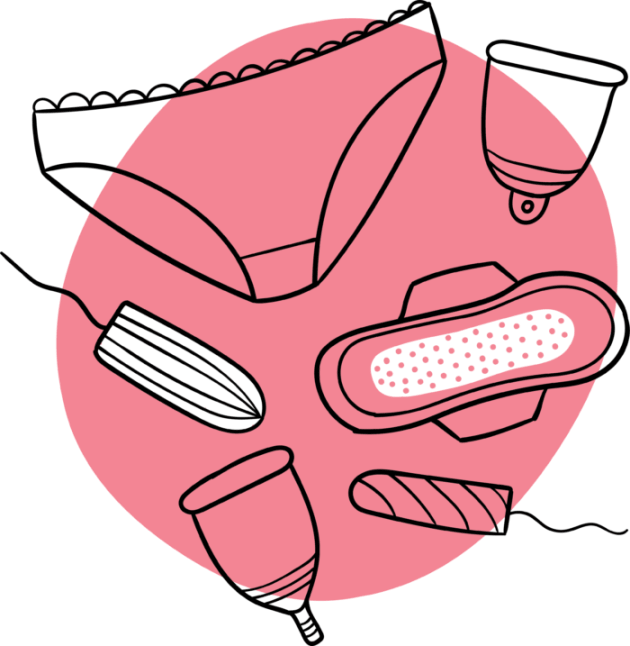Puberty will commonly begin somewhere between the ages of 8 and 16. The process of puberty takes a different amount of time for everyone. During puberty, a person is going to grow faster and develop an adult body. This article is about the changes a person can expect.
Changes that happen to every BODY
Growth
Growth can be very fast over a short period of time during puberty; this is called a growth spurt. Growing this fast might give someone achy-feeling “growing pains.” They might also feel clumsy while they get used to their new size. Remember that everyone will grow at their own rate. Someone might suddenly find that they are a lot taller or shorter than a friend who’s the same age as them!
All of this growth means that a person will also naturally get heavier. They will need more muscles and fat to support their new body. This is totally normal. Some people might find that their shoulders, chests, and hips get wider during puberty, too.
Voice
Everyone’s voice changes during puberty. Voices get deeper because the voice box, or larynx, is growing. During this time, voices can crack or sound high and low while speaking. This is normal and will stop happening in time.
Sweating & Body Odour
During puberty, a person’s body will start to produce more sweat. The changes to their hormones will give their sweat a stronger smell. This is most noticeable under someone’s armpits! Showering regularly and washing sweaty areas with soap can help with the smell.
When bathing, someone can remember to wash in between all of the folds of skin on their body, including armpits, behind ears, between toes, and the vulva, penis, and butt. Wash with gentle, unscented soap and water. If a person has a penis with a foreskin, gently pull the foreskin back and wash underneath it. The vagina is located on the inside of their body and cleans itself naturally, so a person does not need to wash the inside.
Some people choose to use deodorant or antiperspirant to change or cover up the smell of sweat or body odour. It is okay for someone to try different products to find the right one for them.
Skin
During puberty, the skin makes more oil, and sometimes a person’s pores can become blocked with oil. If this happens, they might get pimples or acne. Washing the skin twice a day with a gentle soap and then using lotion that does not have perfume in it could help with acne. If the acne becomes uncomfortable for someone, they could check with a doctor about other ways to take care of acne.
Body Hair
Just like the skin, the hair on a person’s head will make more oil than before during puberty. Washing with shampoo and conditioner more often can help.
New hair can also start to grow EVERYWHERE! Legs, arms, underarms, pubic area, face (for some people, this grows in thicker than others, but EVERYONE has facial hair), stomach, chest, butt, and back.
The amount of new hair is different for everyone. It’s their choice what to do with this body hair, if anything. Some people leave it alone, while others prefer to remove it. If someone is interested in removing hair, they can talk with a trusted adult about shaving, waxing, threading, trimming, plucking, or other options.
Breasts, Periods & Vaginal Discharge
Breast Growth
During puberty, breasts begin to grow and develop. There is no set time when this will start, but a person may be able to tell it is happening because they might tingle, itch, or feel a bit sore as they grow. If a nipple points inward, this is called an inverted nipple. Sometimes a nipple that points inward will change to an outward nipple as the chest grows. Often it won’t. This is totally normal! It is different for everyone.
Things to keep in mind:
Periods (Menstruation)

A person might skip their period sometimes.
This is very normal for someone under the age of 25. Some other reasons a period may not come include being pregnant, experiencing stress, being sick, having a very low body weight, or taking certain medications.
During a period, around 4-6 tablespoons of blood and fluid leave the uterus. To absorb or catch the menstrual fluid, someone could use:
If a person gets their period unexpectedly, they can:
During, just before, or after a period, a person may also notice:
Some things people do that can help:
A person can still do all the activities they enjoy doing while they have their period. Some cultures and religions have ceremonies to participate in or practices to abstain from during menstruation. A person can talk with family, elders, or religious leaders for more information about this.
Vaginal Discharge
A person might notice a sticky fluid in their underwear that can be clear, white, or yellow. The body makes this fluid every day to keep the vagina healthy. The amount of fluid and what it looks like will change throughout the month and will be different from person to person. Sometimes this fluid dries on underwear, but it will wash out.
The Penis, Erections, Ejaculation & Wet Dreams
Penis Growth
Every penis looks different and is a different size, shape, and skin colour. Everyone’s penis will grow at a different rate. Testicles will get bigger, the penis will grow longer, and it will get wider. The size of the penis, while it is soft, will be different than the size of the penis when it is erect or hard. A person’s genetics will decide their penis size, just like genetics decide the shape of someone’s face or the size of their nose.
There is no way for a person to change the size their penis will grow to. There are messages out there that say, “bigger is better.” However, most of these messages come from people who are trying to sell penis-enlarging products, but these products don’t work and may even be harmful. Getting people to feel bad about their bodies is a way for companies to make money. In reality, though, the size or shape of the penis doesn’t actually matter.
Erections
An erection is when blood fills the spongy tissues in the penis, and the penis becomes harder and stands away from the body. Erections can happen from wearing clothes that rub against the penis or during sleep. Sometimes erections happen for no reason at all. These are called random erections. Some people might find random erections happen every few months, but for others it might happen many times a day. If someone gets an erection at a time when they don’t want one, this could feel embarrassing or uncomfortable.
Here are some things they can do that might help:
Erections can also happen from sexy feelings. During an erection, the penis is very sensitive to touch, and it may feel good for a person to rub the penis with their hand. This is called masturbation. Not everyone masturbates, but if a person chooses to masturbate, they should make sure they are in a private place such as a bedroom or bathroom with the door closed. Masturbation will not hurt the penis, testicles, or any part of the body, and it won’t change the body’s ability to make sperm. Not all erections end in ejaculation.
Ejaculation
Ejaculation is when a white or cloudy fluid called semen leaves the tip of the penis. Minutes before this happens, a clear fluid called pre-ejaculate will leave the penis first. This could happen while a person is sleeping as a wet dream or after the penis is touched in a sexual way.
Wet Dreams (Nocturnal Emissions)
Sometimes the penis can get an erection and ejaculate semen while someone is asleep. This is called a wet dream or a nocturnal emission. Not everyone has wet dreams, and that’s normal, too. If a person wakes up and notices semen on their pyjamas or sheets, they may want to shower, change their clothes, or wash their sheets.
Mood Swings
The hormones that make puberty start also bring people new and different feelings. Someone might discover that they have new interests, thoughts, and emotions. Their feelings might change from moment to moment, too. Sometimes a person might have a lot of energy, sometimes very little. They might feel very happy or very sad and might not be sure why. All feelings are okay and give people information about themselves and the world around them. It can help to talk to someone that a person trusts because taking care of feelings is just as important as taking care of the body.
Going through puberty uses a lot of energy, so it is important that a person gets enough food and sleep. Eating plenty of fruits and vegetables will give the body the energy it needs to go through puberty. It’s normal for someone to have cravings for sugary or salty treats during puberty, but these foods won’t provide the same kinds of energy as fruits and vegetables do. When it comes to sleep, most people need about nine hours every night during puberty. The light from phones, TVs, and computers can keep the brain awake, so it’s a good idea to give the brain some time to relax before bed. A person can try reading a book, listening to music, or taking a bath or shower instead.
Puberty is a time when a person can figure out what their amazing body can do! They can try out different activities to learn more about themselves and their body, meet new people, and find new interests. Exercise can be as simple as going for a walk, playing soccer with friends, or joining a team. When someone does physical activities, their brain releases hormones that make them feel happy.
Sexual Feelings
Sexual Feelings
During puberty, it is normal to start having sexy feelings and thoughts. Some people notice they have thoughts like this while watching TV, reading a certain book, or when thinking about a person at school. They might imagine what it would feel like to be in love or to kiss or touch someone. These thoughts could be about boys, girls, or any gender. People don’t get to choose who they like.
It can take some time for a person to get used to these strong new feelings. Questioning who they like during puberty is normal, and they don’t need to have an answer right away. Having a word to describe these feelings can be helpful, however. A few of the words people might use to refer to who they like include straight, gay, bisexual, lesbian, pansexual, or asexual. There are many words to talk about attraction, and someone gets to choose which word or words fit their feelings best.
You can learn more about attraction/orientation by reading our Sexual Orientation article, alongside other resources in the Sexuality and Gender section of the Learning Centre.
Masturbation
Masturbation is when someone touches and rubs their genitals in a way that feels good to them. People may try masturbating because of their new sexual feelings, to get to know their own body, to relieve stress, because they are curious, or because it feels good. People of any age or gender may choose to masturbate or not to masturbate, and both choices are normal. Masturbation is something done in private, like in a bedroom or a bathroom with the door closed.
Orgasms
Blood flows towards the genitals with sexy feelings or when the genitals are being touched. If someone keeps rubbing or touching the genitals, the blood can eventually rush back into the body. This is what causes an orgasm. People say it is like a strong release that feels really good. Not everyone’s body does this, though, and that is normal too.

